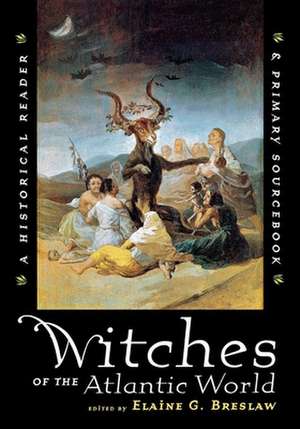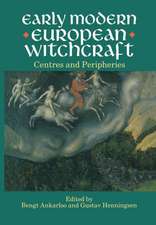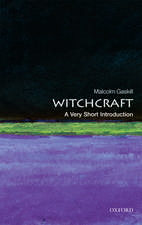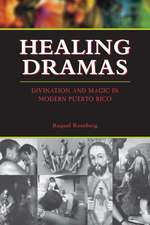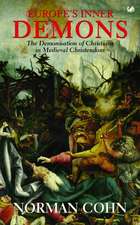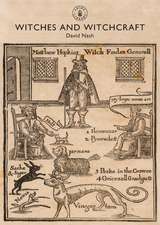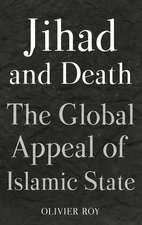Witches of the Atlantic World – An Historical Reader and Primary Sourcebook
Autor Elaine G. Breslawen Limba Engleză Paperback – 31 aug 2000
| Toate formatele și edițiile | Preț | Express |
|---|---|---|
| Paperback (1) | 264.54 lei 6-8 săpt. | |
| MI – New York University – 31 aug 2000 | 264.54 lei 6-8 săpt. | |
| Hardback (1) | 546.76 lei 6-8 săpt. | |
| MI – New York University – 31 aug 2000 | 546.76 lei 6-8 săpt. |
Preț: 264.54 lei
Nou
Puncte Express: 397
Preț estimativ în valută:
50.62€ • 52.96$ • 42.05£
50.62€ • 52.96$ • 42.05£
Carte tipărită la comandă
Livrare economică 02-16 aprilie
Preluare comenzi: 021 569.72.76
Specificații
ISBN-13: 9780814798515
ISBN-10: 0814798519
Pagini: 550
Dimensiuni: 180 x 254 x 33 mm
Greutate: 0.95 kg
Ediția:New.
Editura: MI – New York University
ISBN-10: 0814798519
Pagini: 550
Dimensiuni: 180 x 254 x 33 mm
Greutate: 0.95 kg
Ediția:New.
Editura: MI – New York University
Recenzii
"This is a useful collection of material on witchcraft." Journal of World History "This is undoubtedly one of the best reference works ever published on witchcraft. Breslaw, fresh from her well-received revisionist history Tituba: Reluctant Witch of Salem, brings together work by some of the best-known scholars of the field, including Elizabeth Reis, Carol Karlsen, John Demos, Paul Boyer, Stephen Nissenbaum and David Hall. She organizes primary sources (including the 1486 manifesto Why Women Are Chiefly Addicted to Superstitions) and insightful secondary essays around topics of European, Native American and African witchcraft. The anthology is to be applauded for its commitment to representing cultural variance--showing how, for example, indigenous American magical traditions differed greatly from tribe to tribe. Breslaw's awareness of diverse cultural contexts highlights the multiple functions that witchcraft and anti-witchcraft served in individual communities." Publishers Weekly "...covers a tremendous amount of spatial and temporal ground." Maryland Historical Magazine
"This is a useful collection of material on witchcraft." Journal of World History "This is undoubtedly one of the best reference works ever published on witchcraft. Breslaw, fresh from her well-received revisionist history Tituba: Reluctant Witch of Salem, brings together work by some of the best-known scholars of the field, including Elizabeth Reis, Carol Karlsen, John Demos, Paul Boyer, Stephen Nissenbaum and David Hall. She organizes primary sources (including the 1486 manifesto Why Women Are Chiefly Addicted to Superstitions) and insightful secondary essays around topics of European, Native American and African witchcraft. The anthology is to be applauded for its commitment to representing cultural variance--showing how, for example, indigenous American magical traditions differed greatly from tribe to tribe. Breslaw's awareness of diverse cultural contexts highlights the multiple functions that witchcraft and anti-witchcraft served in individual communities." Publishers Weekly "...covers a tremendous amount of spatial and temporal ground." Maryland Historical Magazine
"This is a useful collection of material on witchcraft." Journal of World History "This is undoubtedly one of the best reference works ever published on witchcraft. Breslaw, fresh from her well-received revisionist history Tituba: Reluctant Witch of Salem, brings together work by some of the best-known scholars of the field, including Elizabeth Reis, Carol Karlsen, John Demos, Paul Boyer, Stephen Nissenbaum and David Hall. She organizes primary sources (including the 1486 manifesto Why Women Are Chiefly Addicted to Superstitions) and insightful secondary essays around topics of European, Native American and African witchcraft. The anthology is to be applauded for its commitment to representing cultural variance--showing how, for example, indigenous American magical traditions differed greatly from tribe to tribe. Breslaw's awareness of diverse cultural contexts highlights the multiple functions that witchcraft and anti-witchcraft served in individual communities." Publishers Weekly "...covers a tremendous amount of spatial and temporal ground." Maryland Historical Magazine
Descriere
Breslaw draws on Native American, African, South American, and African-American sources, as well as the European and New England heritage, to illuminate the ways in which witchcraft in early America was an attempt to understand and control evil and misfortune in the New World.
